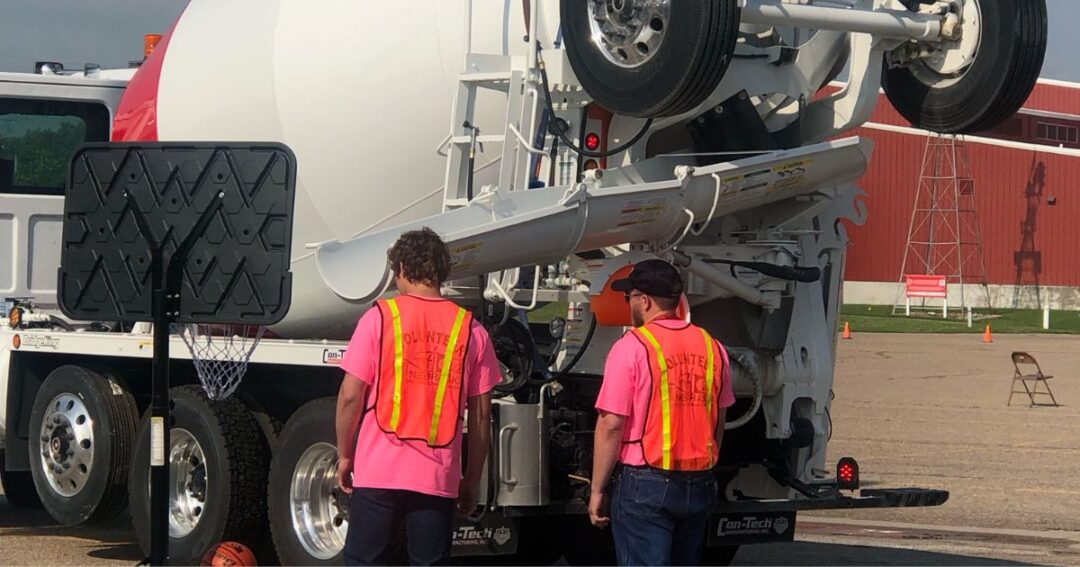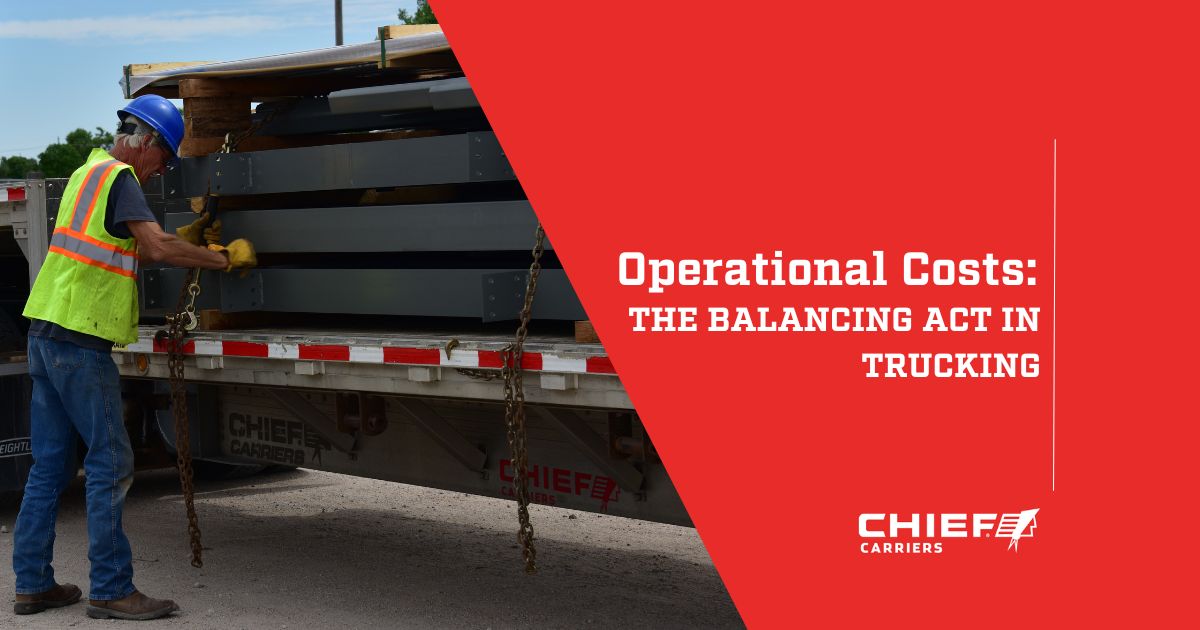Surviving the Rising Trucking Operational Costs
Dive into “Survive the Rising Operational Costs in Trucking” in the latest Driven Too Far blog. Uncover essential strategies and insights for thriving in today’s challenging economic landscape. Your roadmap to success awaits.
Hello, fellow road warriors and industry enthusiasts! I’m Andrew Winkler, your guide through the intricate world of trucking on the “Driven Too Far” podcast.
Today, we’re diving into a topic that hits close to home for every one of us in this industry: navigating the turbulent waters of rising Trucking operational costs.
In our latest episode, we peeled back the curtain on the strategies that trucking companies are deploying to weather this storm. With the economic environment becoming increasingly challenging, it’s crucial for everyone in the trucking sphere, from executives to drivers, to understand and adapt to these changes.

Surviving Trucking Operational Costs
We’re not just talking about survival; we’re talking about thriving in tough times.
I remember a time when my own rig felt the squeeze of a tight budget. There was this one instance where I had to make a hard call on whether to push through a long haul with minimal stops or take the hit on a much-needed maintenance check.
It was decisions like these, often made on the fly, that taught me the importance of strategic planning and fiscal prudence. This episode, and our discussion, stem from these very real, very tough decisions we face on the road.
This blog post is more than just a recap; it’s a toolbox of insights and strategies. Whether you’re a rookie just starting to feel the weight of your wheels or a seasoned driver who’s seen it all, there’s something here for you.
We’re going to dissect the episode’s key points, and I’ll be sharing some additional nuggets of wisdom to help you steer through these challenging economic times.
Navigating Tough Economic Times in Trucking
The trucking industry, like many others, is no stranger to the ebb and flow of the economy. In recent times, we’ve been hit by a wave of challenges that test the resilience and resourcefulness of our community. From fluctuating fuel prices to shifting market demands, trucking companies and individual truckers alike face a landscape that’s constantly changing.
Adapting to these changes requires more than just grit; it demands strategic thinking. It’s not just about cutting costs, but about making smart choices that ensure long-term sustainability.
This is where the true skill of navigating in tough economic times shines through. For trucking companies, it means a careful evaluation of their operations, while for individual truckers, it’s about making every mile and every gallon of fuel count.
But adaptability is the real key. The ability to swiftly adjust to new economic realities, whether it involves altering routes, changing cargo types, or even rethinking business models, is what keeps us afloat. As truckers, we’re no strangers to the need for quick thinking and flexibility. These skills are our best assets in ensuring not just survival, but success, in an industry that’s as unpredictable as the roads we travel on.

Cost-Cutting Strategies for Trucking Companies
In our industry, managing costs effectively can be the line between profit and loss, especially in tough times. One of the primary areas where companies can gain control is through managing discretionary spending. It’s about understanding the difference between the ‘nice to haves’ and the ‘must haves,’ and making tough but necessary decisions.
Discretionary spending in trucking can range from company events to non-essential amenities. While these are important for morale in good times, during a downturn, it’s essential to focus on core business needs. This could mean scaling back on company gatherings or postponing purchases of non-critical equipment.
Fuel management, however, is the real game changer. It’s not just about finding the cheapest fuel, but optimizing routes and load management to reduce fuel consumption. This strategy requires a deep dive into data, understanding where each gallon goes, and finding ways to maximize efficiency.
It involves negotiating with fuel providers, staying within fuel networks for better discounts, and educating drivers on fuel-efficient driving practices. Some companies even invest in technologies that monitor and manage fuel usage more effectively. By tightening the belt on fuel expenses, a trucking company can navigate rough financial waters more effectively.

Operational Efficiency and Decision Making
In the trucking industry, operational efficiency isn’t just a buzzword; it’s the cornerstone of survival, especially in challenging economic times. Analyzing and optimizing load decisions plays a pivotal role in this. It’s about being smart with the loads we take, the routes we choose, and the time frames we commit to.
A key aspect of this is minimizing deadhead miles and ensuring each trip is as profitable as possible. This requires a keen eye on load planning and scheduling, ensuring trucks aren’t traveling empty or taking longer routes than necessary. It’s a delicate balance, one that demands both experience and a deep understanding of logistics.
Moreover, optimizing operational efficiency goes beyond just the loads. It involves scrutinizing every aspect of the operation, from maintenance schedules to driver turnover rates. Regular maintenance can prevent costly breakdowns and keep trucks running efficiently, while reducing driver turnover can save significant costs in recruiting and training.
Trucking companies can also look at technological solutions to aid decision-making. Modern software can provide real-time data on loads, routes, and driver performance, enabling more informed decisions. By embracing these technologies, companies can not only cut costs but also improve their service quality.
The Impact on Truckers and the Workforce
Economic downturns and the resulting cost-cutting measures can have a profound impact on truckers and the wider workforce in our industry. When companies start tightening their belts, it often translates into changes in recruiting practices, adjustments in fleet size, and, inevitably, concerns about job security. These shifts can create an atmosphere of uncertainty and stress among the driving workforce.
I recall a time when the company I was with had to make some hard decisions. We reduced our fleet size, which unfortunately meant letting go of some drivers. This period was tough for everyone involved. It wasn’t just about losing colleagues; it was about the unsettling realization that job security can be fragile in this line of work.
Changes in recruiting strategies can also affect the industry’s dynamics. When times are tough, companies might slow down or halt their recruiting efforts, which leads to fewer opportunities for new drivers entering the field.
This shift can have a long-term impact on the industry, potentially leading to driver shortages when the economy picks back up.
Yet, it’s not all doom and gloom. Such times also bring about a greater focus on retaining the best talent. Companies often invest more in their existing workforce, offering training and development opportunities. It’s a silver lining that can lead to a more skilled and dedicated driving force.

Recognizing Signs of Financial Trouble in Trucking Companies
Recognizing the early signs of a company’s financial trouble can be crucial for drivers to protect their careers and livelihoods. One telltale sign is the delay or skipping of routine maintenance on trucks.
When a company starts cutting corners on maintenance, it’s often a red flag indicating financial strain.
Another warning sign is issues with fuel cards. If drivers find their fuel cards being declined more frequently without a clear explanation, it might suggest cash flow problems within the company. This situation can be especially alarming as it directly impacts a driver’s ability to do their job.
Paycheck irregularities are perhaps the most direct indicator of financial trouble. If paychecks are consistently late, short, or there are unexplained deductions, it’s time to start asking questions. These paycheck issues are often the last straw, signaling severe financial distress.
Truckers should stay vigilant and communicate with their peers. Often, drivers are the first to notice patterns that might indicate a problem. If multiple drivers are experiencing the same issues, it’s likely not an isolated incident.
Lastly, it’s wise to have a contingency plan. Keeping an updated resume and being aware of job opportunities can provide a safety net. Staying informed about industry news and company performance can also help drivers make timely decisions about their career paths.

Staying Informed and Prepared for the Future
Staying informed is not just beneficial, it’s essential. Keeping abreast of industry trends, economic indicators, and regulatory changes can provide crucial insights for future planning. Awareness of these factors allows truckers and companies to anticipate challenges and adapt strategies accordingly.
Continuous adaptation is the name of the game in trucking. Whether it’s technology advancements, shifts in consumer demand, or changes in environmental regulations, each of these can significantly alter the playing field. Truckers and industry stakeholders must be agile, ready to embrace new methods, routes, or even business models.
One practical way to stay informed is through industry publications, forums, and podcasts like “Driven Too Far.” These resources can offer a wealth of knowledge, from market analyses to technological innovations.
Networking with fellow truckers and industry professionals is also invaluable. Sharing experiences and insights can lead to better preparedness for what lies ahead.
Additionally, investing in continuous learning and skill development can be a game-changer. Whether it’s understanding new logistics software or staying up-to-date with the latest driving regulations, ongoing education can make a significant difference in adapting to the industry’s future.
Industry Trends and Future Outlook
The trucking industry is at a crossroads, with economic challenges sparking significant changes and innovations. We’re witnessing a shift towards more efficient operations, driven by both necessity and technological advancements.
This evolution is not just about surviving current challenges but also about positioning for future success.
One notable trend is the increasing adoption of technology, from logistics software to automated tracking systems. These tools are helping companies optimize routes, manage fuel consumption more effectively, and improve overall operational efficiency.
For truckers, this means adapting to new technologies and systems, which can be both a challenge and an opportunity for growth.
Environmental concerns are also shaping the industry’s future. There’s a growing push towards sustainability, with an emphasis on reducing emissions and exploring alternative fuel options. This trend is likely to influence everything from vehicle design to route planning, and staying ahead of these changes will be crucial for companies and drivers alike.
Looking ahead, the industry must also brace for the impact of autonomous vehicles. While full autonomy may still be a ways off, its gradual integration will undoubtedly alter the landscape of trucking. It’s important for both truckers and companies to keep an eye on this development and prepare for how it might affect job roles and industry dynamics.

Final Thoughts
As we wrap up this journey through the challenges and strategies in the trucking industry, it’s clear that adaptability and informed decision-making are key.
We’ve discussed the importance of cost management, operational efficiency, and recognizing signs of financial trouble. These insights are crucial not just for survival, but for thriving in this dynamic industry.
The trucking world is continually evolving, and staying ahead means being flexible and proactive. It’s about embracing change, whether it’s adopting new technologies or adjusting to economic shifts. Remember, knowledge is power in this industry, and staying informed is your best defense against uncertainty.
For a more in-depth exploration of these topics and to hear more stories from the road, I invite you to listen to the full episode of “Driven Too Far: The Truth About Trucking.” You can find it on our website, as well as on Spotify, Apple Podcasts, and YouTube. Each episode is designed to give you the insights and advice you need to navigate the trucking industry’s challenges.
Andrew Winkler
Andrew Winkler is the only executive in the trucking industry willing to get in the cab and listen to you. He started out in the driver’s seat like you–loving a life on the road, missing a family at home, and yelling at dispatch over the phone. He knows how it feels to be driven too far, which is why he’s giving you the truth about trucking so you can have both your family and your career.
Interested in having Andrew Winkler appear as a guest on your show? Have a show topic idea? Want to appear as a guest on Driven Too Far? Have a question?

